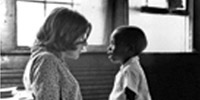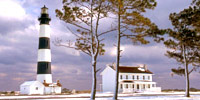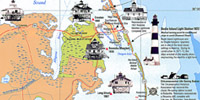Like his father before him, “Doc” Cannon was a mountain doctor helping patients in Appalachia in and near Balsam Grove. His classic leather medical bag opened in the middle to form two wings of trays containing all the medical cures he could carry with him. His trusty International Scout braved the ruts and boulder-laced trails of backwoods roads, rickety bridges with their snaggletooth appearance, and the mushy mud lanes leading to the houses he needed to reach.
Although it was 1964, most of his patients had no form of communication with the outside world. On Mondays and Fridays, Doc would go a couple of miles to a general store in Jackson County where he picked up his mail and any notes left there for him from families who needed a cabin call. He often then would travel twenty-five arduous miles across the mountain from his clinic to reach those families.
The store counter, a front porch, or the hood of his Scout International could instantly turn into an examination table. All he needed was a few minutes of looking into their eyes, throats, taking their blood pressure, and speaking with his far-flung patients to make a diagnosis and begin treatment.
His pay? Sometimes a five-dollar bill might be offered, but most often it was in the form of vegetables or a watermelon in summer and moonshine in winter. Patients who could get to the general store for an examination were to bring two rocks with them that would become part of the hospital he was building.
I rode with Doc through the hills and into the coves of isolated mountainous areas to find out just who this man of healing with a heart of pure gold was. My photographs illustrated his story that was originally recorded in the Time-Life book The Physician, published in 1967 as part of the Life Science Library.
Over time, I learned from our late-night talks that he had left behind his South Carolina home and private medical practice during the 1950s to work with Dr. Albert Schweitzer. He had decided that to work only for money traded for worldly possessions simply was not who he wanted to be or what he wanted to be remembered for. His work lay, he had decided, with the underprivileged and in giving them a chance at improved health and a better life.
Thanks, Doc.
Doc Cannon’s General Store Clinic




Enter your text here
Enter your text here



BOOKS
BLACK & WHITE
PHOTOGRAPHS
POSTERS & MAPS
COLOR
PHOTOGRAPHS
THE STORIES BEHIND
THE PHOTOGRAPHS
COLOR
PHOTOGRAPHS

BLACK & WHITE
PHOTOGRAPHS

THE STORIES BEHIND
THE PHOTOGRAPHS

BOOKS

Enter your text here
Enter your text here
POSTERS & MAPS

Clicking this button takes you to the PHOTOS STOREFRONT where you will need to navigate to this photograph to purchase it.